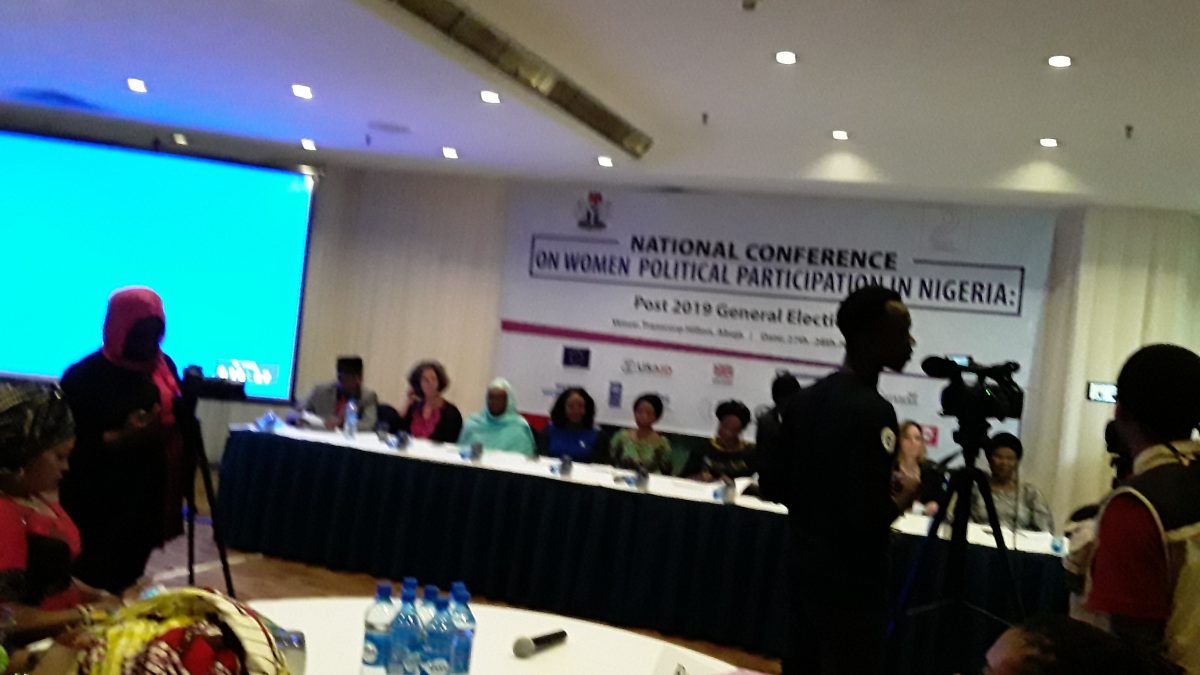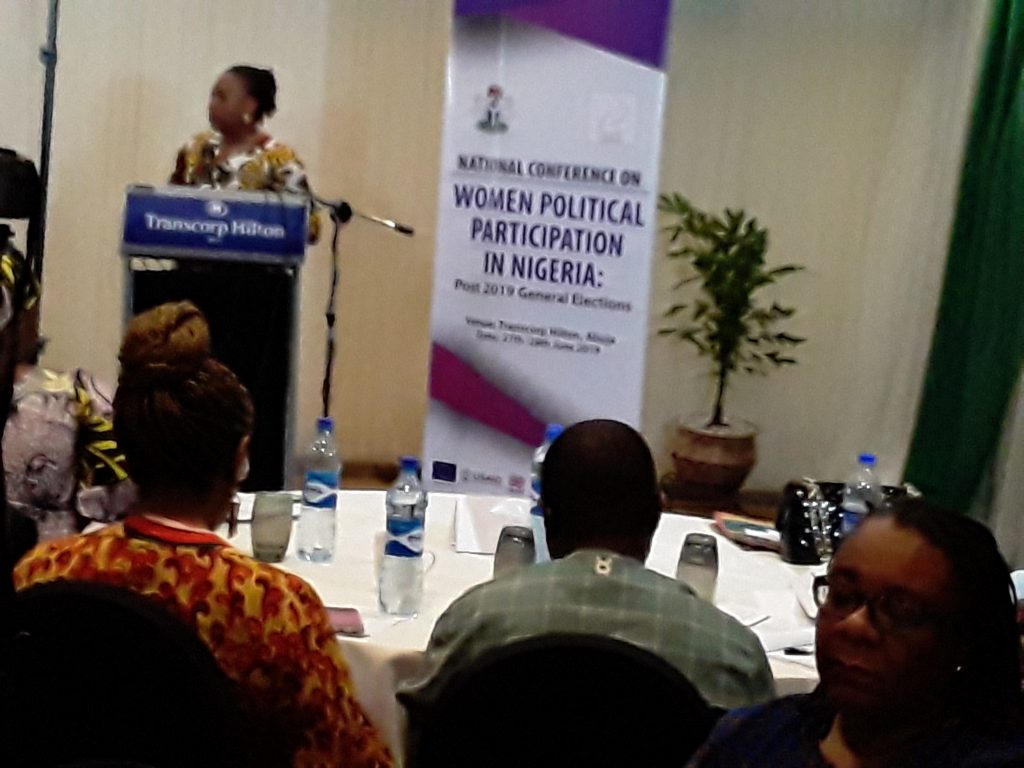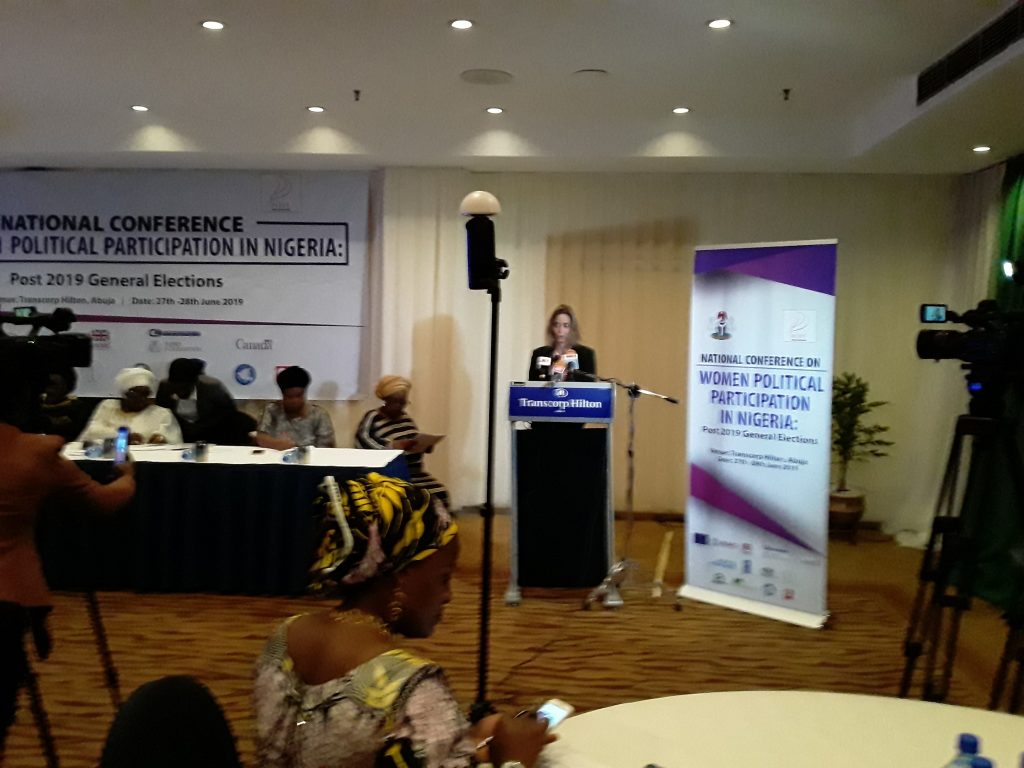NIGERIAN WOMEN AND 2019 GENERAL ELECTIONS – A POST MORTEM

BY LADY NKIRU CELINE OKORO, Abuja, JULY 2019.
Cross section of participants at the conference.
It was a national roll call on Thursday June 27, 2019 of female politicians – young, middle aged, old and not so old; who are participants, political influencers and support groups from Nigeria’s women’s movement and gender space passionate and committed to changing the narrative of increasing women’s participation in elective and appointive positions at local, state and national levels in the life time of this administration and beyond.
Titled, “National conference on Women’s political participation in Nigeria: Post 2019 General Elections Agenda”; the two day event was put together by Women in Politics Forum led by Barr. Ebere Ifendu with active support from local and international development partners including Ms. Comfort Lamptey, The United Nations Women Representative to Nigeria and Ecowas; Ms. Maria – Theresa Mauro, project co-ordinator, European Center for Electoral Systems (ECES), United Nations Development Program (UNDP); United States Aid for International; Development (USAID), United Kingdom Aid (UKAid), Canadian High Commission to Nigeria, Ford Foundation and Norway Deputy Ambassador to Nigeria to mention but a few.
The desire for increased women representation in elective positions at national and state levels suffered a major setback in the outcome of 2019 general elections as results show a downward spiral from 6.3% national average in 2015 general elections to a disappointing 3.4% in the post 2019 general elections. Although the 2019 election recorded the highest women’s political participation in 20 years of un interrupted democratic governance with over 3000 women contesting primaries of various political parties, the outcomes were abysmal.

Expectedly, this was a cause for serious concern for all stakeholders from Nigeria’s electoral umpire- The Independent Electoral Commission INEC, to the International and local development partners that provided resources to support women’s political participation in 2019 elections. Across the length and breadth of Nigeria, stakeholders sought to find out what went wrong? How can these be remedied and redressed preparatory to 2023 elections.
The Nigerian women’s political conference, sought to engage systems and structures as well as participants to review what worked, what did not work and proffer solutions and remedies preparatory to 2023 general elections.
The sub themes at the conference included:
Incidences of Violence against Women During the 2019 elections; Role of Political Parties with Respect Women’s’ political Participation, Civil Society Engagements, Election Management Bodies and the Legal Framework for the conduct of 2019 elections.
Also examined were the role of the media; the Private Sector, International Community and Security apparatus used in the conduct of 2019 elections.

D
The absence of women in decision making has for long been a cause for concern in Nigeria. Presently, the total percentage of women in political offices in Nigeria is put at a mere 8% or less. Despite provision in the Beijing declaration and Platform for Action recommending that governments support at least 30% affirmative action for women in political space and the recommendation in the National Gender Policy establishing a benchmark of 35% for women’s representation in public office very little has been achieved in this regard.
The low representation of women has been ascribed to the array of barriers that the women in Nigeria face in their quest for full participation in various aspects of social life. Some of the challenges are associated with entrenched cultural attitudes, which hinder women participation in public life as well as politics. Others include an apparent lack of internal democracy as exhibited by the trend in the 2019 general elections where many women indicated their interest as aspirants but few were selected as candidates by their political parties.
Meanwhile, democracy is about fair representation of all interest groups in the society and the low representation of women is a violation of the principle of democracy. Poor representation denies women mass participation in governance. Several efforts have been made to address this situation. These include the establishment of women political empowerment offices; establishment of Nigeria Women Trust Fund; and the establishment of Nigerian women lobby group.
Other efforts include the institution of an INEC gender policy, the national multi stakeholder dialogue; the initiation of several interventions to actualize affirmative action and the convening of the Nigeria Women Strategy Conference.
The poor representation and participation of women at both the political and appointive across board in Nigeria since 1999 should not only be discussed but should be evidence based to drive home the truth for policy makers, planners, government agencies, development partners, etc. to enable stakeholders make informed decisions with regards to projects and programmes to enhance women in decision making and women’s political participation in Nigeria.
To achieve gender equality and empower all women and girls in line with the new Sustainable Development Goals there is need, these recommendations should be implemented as a matter of urgency: They include but not limited to:
- The government should fully implement all existing gender policies to increase the political participation and representation of women, and consideration should be given to implementing the measures proposed in the Women Participation in Elective Office Support Bill 2018.
- The government is encouraged to be more supportive of efforts of women’s organizations to increase women’s participation in politics and leadership.
- Political parties should increase the number of women in leadership and decision-making roles within their party, as well as the number of women candidates nominated for election. Political parties should also support them to access campaign funds.
To Be Continued
